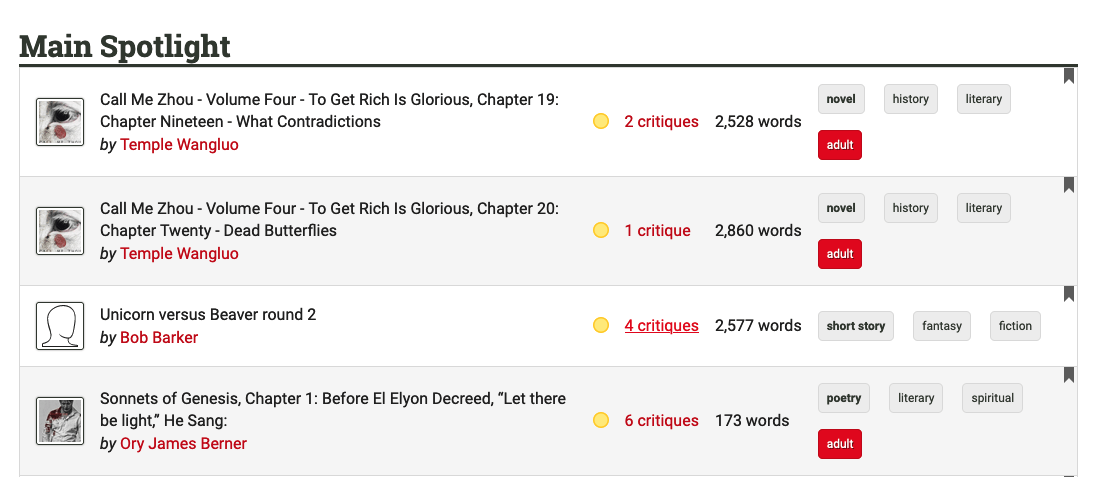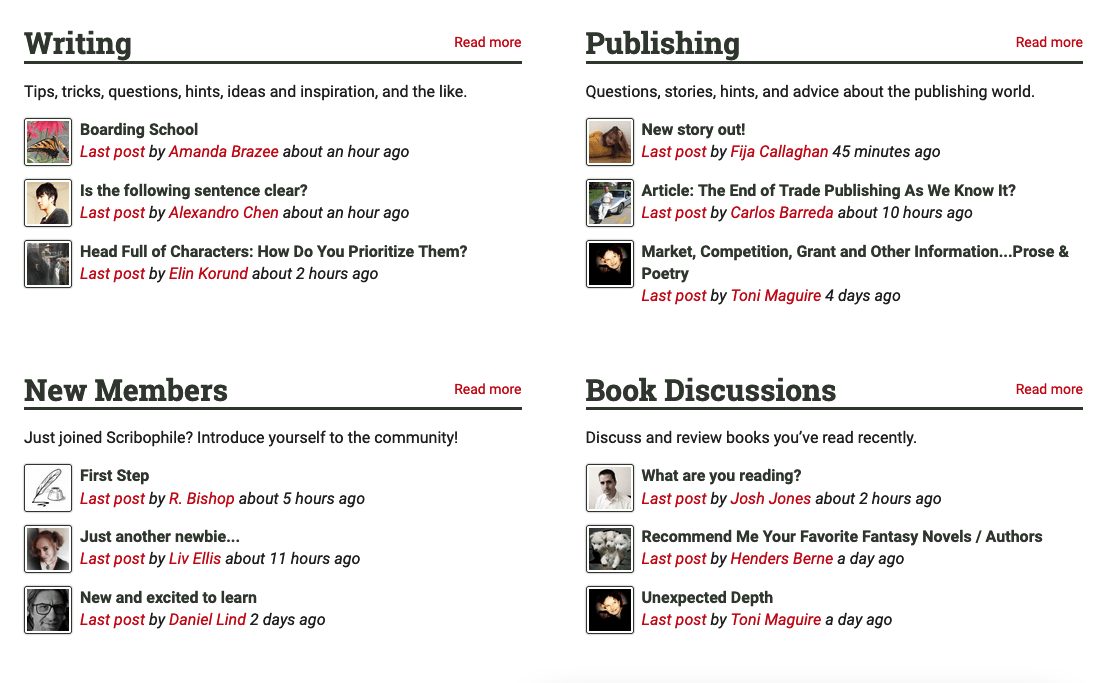Scribophile: Feedback Community for Writers
We often see writing as a solitary activity. The image of a coffee-fueled, wild-eyed writer hunched over their keyboard is pretty universal. But the best writers know this depiction is a romanticization. The final product—your book—is always better when you have a community of fellow writers to help edit, revise, and reimagine it. That’s where Scribophile comes in.
I’ve mentioned this site before in a list of excellent author communities. Today we’re going to inspect Scribophile and what this unique take on an author community offers you!
What Is Scribophile?
Designed for writers, Scribophile is part critique and editing hub and part writing and publishing forum. Bringing these two elements together makes Scribophile one of the most versatile and useful tools for discussing writing, publishing, and editing while developing your story through peer editing.

If that’s not enough, Scribophile brings together even more resources through its Academy hub, regular blog posts, and user-sponsored writing contests. This is more than just a writing group or beta-reading site; Scribophile seeks to be a holistic writing hub for authors at all levels.
Getting To Know Scribophile
A lot is going on once you sign up and get your first look at the Dashboard. The navigation includes nine separate pages/tabs, plus you’ll have a couple of additional profile pages that are useful once you start interacting with other users.

The Home tab pulls together new posts in the forums and critique pages. It can be a little overwhelming to just browse through all the content, but the Home tab does a good job of simplifying and organizing what’s new. The Favorites section is helpful, letting you see new posts and content from your favorite users quickly.
Writing
The Writing tab is home to Scribophile’s online writing critique groups. If you want to share your own writing, you’ll need to use their karma system—you’ll earn karma by providing critiques to other writers. Once you earn enough (the equivalent of 2 or 3 critiques) you’ll be able to post your own writing.
Their karma system means you’ve got to read and contribute to the writing community before you can post your own work. I love this system; it ensures participation and drives you to be a beta reader before you can ask for your own beta readers. That alone is a powerful way to improve your writing.
Finding work to critique is easy—just look at the list of works and pick one! Scribophile does an outstanding job of providing details like word count, genre, and more to help you know what you’re looking at:

Once you access one of the posted stories, you’ll have a bunch of information about the content they’ve posted, the author, and the context (such as where this content fits into a longer narrative). You can also review the comments other users leave; which is always useful before you critique other work to avoid repetition.
Authors
The Authors tab highlights recent activity from other users. There’s also a nice highlight of writers’ workshop pieces that are published; giving those users some free publicity for their work!
For newer users, this is a great page to find the Scribophile ‘power users’ and read their content/critiques. If you’re getting ready to dive into offering feedback or want to post your own short story, start by reading what the accomplished users have already posted.
Groups
This, to me, is where the magic really happens. The online writing community is best served when we can subdivide ourselves into specialized groups. Imagine a forum of 1,000 writers all interested in discussing their work; it would devolve into a lot of noise very quickly. Some posts would be completely ignored simply due to volume. Others would become a mess of tangential conversations.
Now take those same 1,000 writers and offer them 100 sub-groups that specialize in different genres, styles, and the publishing journey. These smaller groups might have large memberships too, but the conversation will stay focused.
There are a TON of groups; it’s worth taking a minute to think about the kind of group you’re after and joining a few. That might include genre-specific fiction writing groups or groups focused on article and blog writing.
You can find a lot of nuanced groups too. If you’re looking for brutally honest critique partners, The Brutal Butchers is where you belong. Maybe you need some advice and encouragement before you self-publish; Self-Pubbed is a large and active group of other self-published authors. Whatever kind of online writing group you need, Scribophile has like-minded individuals.
Forums
The Scribophile forums are where all the group activity takes place. Each group has its own forum thread.

But the forums are more than that; they loosely grouped the conversations around writing, publishing, new members, and book discussions (among others). Dive into any category and you’ll find lots of lively conversations. Take this thread about a single sentence. The author is trying to ensure the sentence is clear. Lots of users chime in with advice, support, requests for context, and more.
If you’re looking for a creative writing community, the Scribophile forums are exactly what you need.
Contests
Scribophile groups sponsor writing contests! It seems like a fun way to get to know more writers and get some of your work out there.
Blog
The blog is a little thin. But I wouldn’t let that taint my Scribophile review; they’re currently hiring bloggers and they’ve had some solid guest authors in the past. The content there is great, there’s just not a lot.
If you’re taking part in the Scribophile community, you’ll definitely want to subscribe and check out their articles, but I wouldn’t call the blog the major draw. If anything, it’s a smart SEO play by the Scribophile team to help new users discover them.
Academy
The Scribophile Academy page is a collection of user-generated content about different aspects of writing and publishing. Much like the blog, it’s a good SEO move. There’s some fantastic content. like this article about writing effective critiques.
For new and growing authors, these resources are pretty essential. Scribophile’s resources are very focused on writing and presenting your work for review. If you need more resources to help you publish and sell your work once it’s done being edited, check out Lulu’s Resources page.
Using Scribophile
The community of writers on Scribophile makes it a valuable tool at all stages of writing and publishing. Beta readers can be hard to find, but Scribophile’s system for connecting content with critiques is a close substitute and helps refine your work section by section.
Pricing Plans
Scribophile offers access to all their features for free. The paid plan comes in at $65/year, which isn’t too pricey. When you go premium, they give you some useful features like the option to post as many works for critique at a time as you’d like or many ways to ‘spotlight’ your work and find more critiques.
They do a good job offering all the major features for free and making the premium option truly an option.
Beyond the Basics
I’ve only scratched the surface of what Scribophile offers authors. The beta readers and critiques are the most relevant for most, but you can find so much more in the forums and groups.
One of my favorite ‘minor’ features is the scratchpad—a way to write any other user a quick note. It’s a great way to develop personal relationships with other writers.

Create Your Book
Use Lulu's free templates to easily create and publish your book today.
Is Scribophile Worthwhile?
If you’re in the market for online critique groups, you want Scribophile. There isn’t really much of an argument here. Their site is full of active and thoughtful readers who will give honest feedback.
And if you’re more interested in just finding a community of writers to discuss writing, editing, publishing, or the life of a writer, Scribophile is phenomenal. If there’s a more robust and active community out there, I’ve not found it.
With Scribophile free to use, I really can’t think of a reason not to use their platform.




